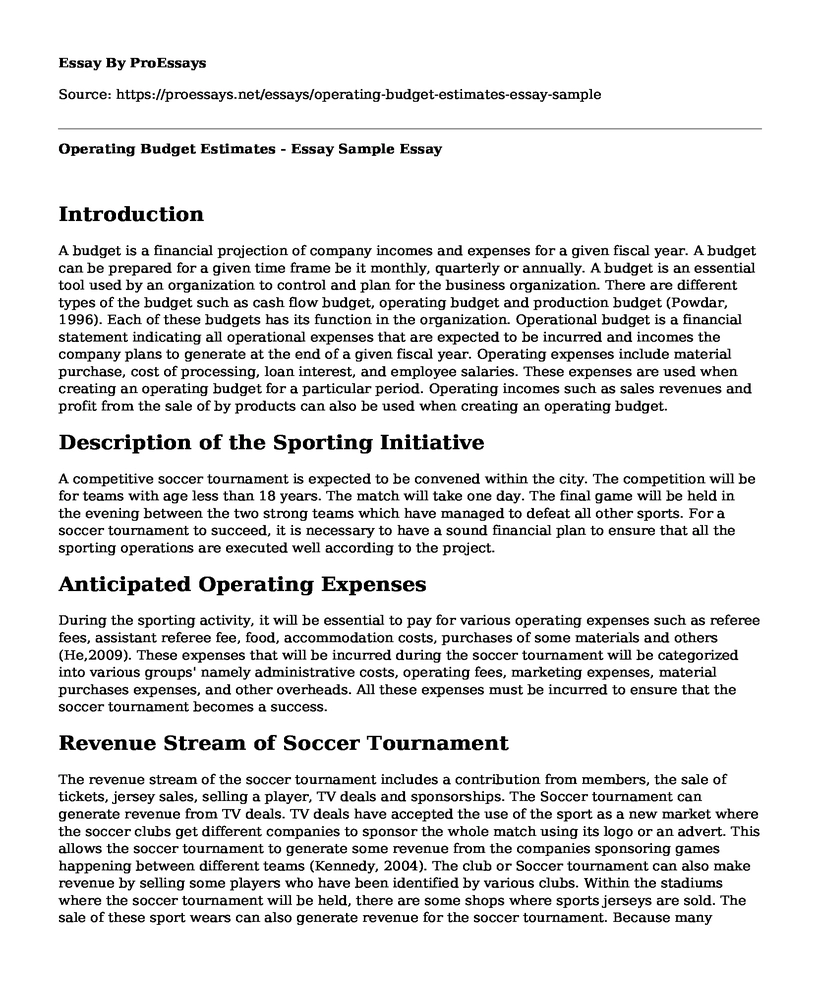Introduction
A budget is a financial projection of company incomes and expenses for a given fiscal year. A budget can be prepared for a given time frame be it monthly, quarterly or annually. A budget is an essential tool used by an organization to control and plan for the business organization. There are different types of the budget such as cash flow budget, operating budget and production budget (Powdar, 1996). Each of these budgets has its function in the organization. Operational budget is a financial statement indicating all operational expenses that are expected to be incurred and incomes the company plans to generate at the end of a given fiscal year. Operating expenses include material purchase, cost of processing, loan interest, and employee salaries. These expenses are used when creating an operating budget for a particular period. Operating incomes such as sales revenues and profit from the sale of by products can also be used when creating an operating budget.
Description of the Sporting Initiative
A competitive soccer tournament is expected to be convened within the city. The competition will be for teams with age less than 18 years. The match will take one day. The final game will be held in the evening between the two strong teams which have managed to defeat all other sports. For a soccer tournament to succeed, it is necessary to have a sound financial plan to ensure that all the sporting operations are executed well according to the project.
Anticipated Operating Expenses
During the sporting activity, it will be essential to pay for various operating expenses such as referee fees, assistant referee fee, food, accommodation costs, purchases of some materials and others (He,2009). These expenses that will be incurred during the soccer tournament will be categorized into various groups' namely administrative costs, operating fees, marketing expenses, material purchases expenses, and other overheads. All these expenses must be incurred to ensure that the soccer tournament becomes a success.
Revenue Stream of Soccer Tournament
The revenue stream of the soccer tournament includes a contribution from members, the sale of tickets, jersey sales, selling a player, TV deals and sponsorships. The Soccer tournament can generate revenue from TV deals. TV deals have accepted the use of the sport as a new market where the soccer clubs get different companies to sponsor the whole match using its logo or an advert. This allows the soccer tournament to generate some revenue from the companies sponsoring games happening between different teams (Kennedy, 2004). The club or Soccer tournament can also make revenue by selling some players who have been identified by various clubs. Within the stadiums where the soccer tournament will be held, there are some shops where sports jerseys are sold. The sale of these sport wears can also generate revenue for the soccer tournament. Because many people across the globe love the soccer tournament and when the fans see the name of a sponsor on the jersey of the club, they buy more from the sponsor. The sponsor will, therefore, forward a given percentage of the gain to the club.
Budget Assumptions
When preparing the operating budget, it is essential to assume that many fans will attend the tournament. The price of the ticket will remain constant throughout the match to allow easy calculation of revenue generated. The competition will also take only two days to end meaning that the budget will be created for two days. The operating budget must have a contingency balance of 5%, and the budget must use a budget allocation model. Finally, revenue will be generated from different sources, and the organizers of the tournament will meet all the expenses required during the competition.
The Goal of the Budget
The purpose of this budget is to ensure that there is an efficient allocation of funds to every sport activity to ensure that the tournament becomes a success. This will ensure there is no budget deficit which may render the match unsuccessful.
Conclusion
The budget has a surplus which shows that the tournament will have sufficient funds to support all the operations. At the sometime expenses are less than the revenue the club expects to generate, and this will also give the Board of directors' confidence to accept the budget. The budget has overstated expenses and understated revenues, and this ensures that the club cannot use all the expenses. In preparing the budget accrual basis of accounting was applied and this provides that the club will only account for revenue before cash is received and before costs are incurred. Finally, the budget is self-explanatory because the board of directors will be able to see the number of items the club anticipate to sell within two days.
References
Powdar, J. C. (1996). The Operating Budget: A Guide for Smaller Governments.
Kennedy, D. (2004). Locality and professional football club development: the demographics of football club support in late Victorian Liverpool. Soccer & Society, 5(3), 371-391. doi:10.1080/1466097042000279616
He, X. (2009). The Measurement and Control of Chinese Administrative Expenses: Perspectiveinto Administrative Expenses. Journal of Politics and Law, 2(2). doi:10.5539/jpl.v2n2p27
Cite this page
Operating Budget Estimates - Essay Sample. (2022, Dec 14). Retrieved from https://proessays.net/essays/operating-budget-estimates-essay-sample
If you are the original author of this essay and no longer wish to have it published on the ProEssays website, please click below to request its removal:
- The Men vs. Women Challenge Campaign by Nike
- Essay on Important Changes for Businesses and Managers as They Relate to SOX
- Organizational Changes on Samsung and Apple Example
- Essay Sample on State's Capital Budgets
- Essay Example on Estate Planning: Bequeathing Assets & Settling Taxes
- Uber: Rise and Fall of a Disgraced Giant - Essay Sample
- Essay Example on Microsoft: Transforming Humanity's Future Through Cloud Tech







